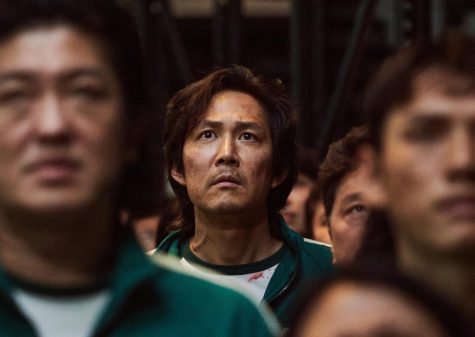Game changer
The complicated impact of Netflix’s “Squid Game”
November 5, 2021

Childhood playground games become murderous situations of life and death. Poverty-stricken debtors succumb to societal pressure and set aside their morals for the sake of potential wealth. Adversaries become allies. Friends become foes. Audiences cannot help but watch with bated breath.
Netflix thriller series “Squid Game” premiered on Sep. 17, and it already has an estimated worth of $900 million according to The Independent. It shattered several records for the streaming platform and earned acknowledgement and praise as the first-ever Korean program to claim the number one spot atop USA Netflix’s most-watched list.
The show focuses on the narrative of Seong Gi-hun (Lee Jung-jae), a man struggling to pay off his debts who wants to set a finer example for his daughter. In a moment of sheer desperation, Seong decides to participate in a tournament with a grand prize of 45.6 billion won (South Korean currency). He soon realizes that every other participant is also in the midst of financial turmoil.
The six rounds of gameplay feature specific children’s games, but they each have an unfortunate, sickening twist: Rather than simply sitting on the sidelines and watching, those who fail to complete the games suffer a fatal punishment. Seong must be aware of his competitors, the sabotages put in place by the officials and the violent procedures within the games themselves if he has any hope of surviving.
Netflix patrons across the globe will agree that the series features sobering themes of ruthlessness, betrayal and immorality, but Seattle Pacific University students shared how “Squid Game” has impacted them on an individual level.
Sophomore political science major Madi Stephens acknowledged the economic exploitation featured in the show, and she also observed threads of progressivism weaving through each episode.
“I kind of just saw it as, like, underlying socialist propaganda,” said Stephens. “Money was the root of all the evil.”
Regarding the image of a warped socio-economic hierarchy, Stephens questioned the fictionality of “Squid Game” and wondered if present-day civilization reflects any similar behavior.
“I feel like it alluded to what society can be like, to be honest,” said Stephens. “If someone has enough money, they could pretty much rule over someone’s life and their future.”
Aside from any political ties “Squid Game” may feature, its visual elements attract the audience’s attention and will likely result in wonderings about the use of specific colors or symbols.
Sophomore biology major Gum Nau mentioned how the colorful sets and props emerged as significant contributors to the underlying meaning of the series.
“I think the bright visuals and design of the game rooms stands out for me,” said Nau. “The story was never meant to have a happy ending, and the bright colors accentuate the irony of the situation for the players.”
Nau elaborated on how the games leave each individual player not only physically beaten and bruised, but mentally shaken as well.
“The concept of playing childhood games…to escape the harsh reality of life for the players is also very interesting,” said Nau. “It’s very psychopathic to entice struggling adults to play childhood games.”
In stark contrast to the show’s vibrant color palette, it emphasizes dark moments of violence. Senior human applied biology major Zachariah Rothschiller discussed his reaction to people losing their lives in such graphic fashion.
“I liked the gore in ‘Squid Game’ because it gauges the weight of the player deaths,” said Rothschiller. “It actually has a purpose.”
Rothschiller expressed that while death occurs frequently in each episode, its meaning transcends deeper than viewers may realize.
“Death is the consequence of all the games,” said Rothschiller. “The charming setting will often end up with blood splatters littered with dead bodies. The entire show, creepy music sets the expectation for some kind of horror. It is this morbid hybrid of innocence and violence that psychologically plays on our fears.”
Another impactful element of “Squid Game” is its portrayal of the Korean language and culture. Sophomore business major Sophia Lee, also the vice president of SPU’s Korean Student Association, appreciated the representation in the show.
“I was very proud of how K-culture got popular and how Americans got interested in it,” said Lee. “Even in KSA’s second meeting, our theme was ‘Squid Game’. We played ‘red light, green light’ and we made Dalgona, and it seemed like people had fun.”
Lee spoke of the show in a nostalgic way, and it caused her to recall moments from her own upbringing.
“My favorite element was their acting skills and the games they used, since I played those games when I was young,” said Lee. “It was like going on the adventure of my childhood.”
While “Squid Game” may not be the program of choice for those with a low tolerance for gore and violence, no one can deny the layers of meaning within it. Its power, emotion and raw portrayal of the human condition leads to influential conversation about Korean culture that has taken the entire world by storm.
“Overall, I was very impressed [with ‘Squid Game’] and the impact of it,” said Lee. “I loved how it was number one on USA Netflix. I was very proud to be Korean.”


























































































